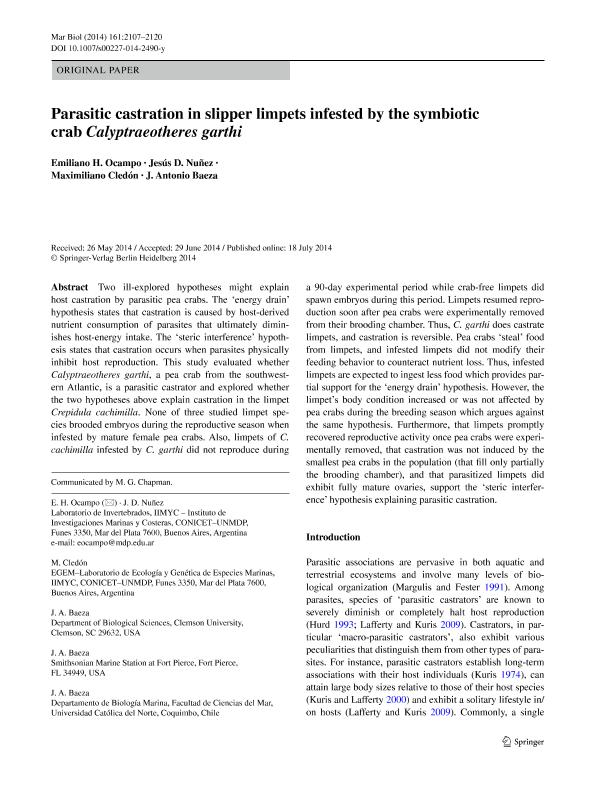Mostrar el registro sencillo del ítem
dc.contributor.author
Ocampo, Emiliano Hernan

dc.contributor.author
Nuñez, Jesus Dario

dc.contributor.author
Cledón, Maximiliano

dc.contributor.author
Baeza, J. Antonio
dc.date.available
2018-01-30T18:55:52Z
dc.date.issued
2014-07
dc.identifier.citation
Ocampo, Emiliano Hernan; Nuñez, Jesus Dario; Cledón, Maximiliano; Baeza, J. Antonio; Parasitic castration in slipper limpets infested by the symbiotic crab Calyptraeotheres garthi; Springer; Marine Biology; 161; 9; 7-2014; 2107-2120
dc.identifier.issn
0025-3162
dc.identifier.uri
http://hdl.handle.net/11336/35072
dc.description.abstract
Two ill-explored hypotheses might explain host castration by parasitic pea crabs. The ‘energy drain’ hypothesis states that castration is caused by host-derived nutrient consumption of parasites that ultimately diminishes host-energy intake. The ‘steric interference’ hypothesis states that castration occurs when parasites physically inhibit host reproduction. This study evaluated whether Calyptraeotheres garthi, a pea crab from the southwestern Atlantic, is a parasitic castrator and explored whether the two hypotheses above explain castration in the limpet Crepidula cachimilla. None of three studied limpet species brooded embryos during the reproductive season when infested by mature female pea crabs. Also, limpets of C. cachimilla infested by C. garthi did not reproduce during a 90-day experimental period while crab-free limpets did spawn embryos during this period. Limpets resumed reproduction soon after pea crabs were experimentally removed from their brooding chamber. Thus, C. garthi does castrate limpets, and castration is reversible. Pea crabs ‘steal’ food from limpets, and infested limpets did not modify their feeding behavior to counteract nutrient loss. Thus, infested limpets are expected to ingest less food which provides partial support for the ‘energy drain’ hypothesis. However, the limpet’s body condition increased or was not affected by pea crabs during the breeding season which argues against the same hypothesis. Furthermore, that limpets promptly recovered reproductive activity once pea crabs were experimentally removed, that castration was not induced by the smallest pea crabs in the population (that fill only partially the brooding chamber), and that parasitized limpets did exhibit fully mature ovaries, support the ‘steric interference’ hypothesis explaining parasitic castration.
dc.format
application/pdf
dc.language.iso
eng
dc.publisher
Springer

dc.rights
info:eu-repo/semantics/openAccess
dc.rights.uri
https://creativecommons.org/licenses/by-nc-sa/2.5/ar/
dc.subject
Steric Interference
dc.subject
Pea Crabs
dc.subject
Limpets
dc.subject
Parasitic Castration
dc.subject.classification
Otras Ciencias Biológicas

dc.subject.classification
Ciencias Biológicas

dc.subject.classification
CIENCIAS NATURALES Y EXACTAS

dc.title
Parasitic castration in slipper limpets infested by the symbiotic crab Calyptraeotheres garthi
dc.type
info:eu-repo/semantics/article
dc.type
info:ar-repo/semantics/artículo
dc.type
info:eu-repo/semantics/publishedVersion
dc.date.updated
2018-01-26T18:56:39Z
dc.journal.volume
161
dc.journal.number
9
dc.journal.pagination
2107-2120
dc.journal.pais
Alemania

dc.journal.ciudad
Berlin
dc.description.fil
Fil: Ocampo, Emiliano Hernan. Consejo Nacional de Investigaciones Científicas y Técnicas. Centro Científico Tecnológico Conicet - Mar del Plata. Instituto de Investigaciones Marinas y Costeras. Universidad Nacional de Mar del Plata. Facultad de Ciencia Exactas y Naturales. Instituto de Investigaciones Marinas y Costeras; Argentina
dc.description.fil
Fil: Nuñez, Jesus Dario. Consejo Nacional de Investigaciones Científicas y Técnicas. Centro Científico Tecnológico Conicet - Mar del Plata. Instituto de Investigaciones Marinas y Costeras. Universidad Nacional de Mar del Plata. Facultad de Ciencia Exactas y Naturales. Instituto de Investigaciones Marinas y Costeras; Argentina
dc.description.fil
Fil: Cledón, Maximiliano. Consejo Nacional de Investigaciones Científicas y Técnicas. Centro Científico Tecnológico Conicet - Mar del Plata. Instituto de Investigaciones Marinas y Costeras. Universidad Nacional de Mar del Plata. Facultad de Ciencia Exactas y Naturales. Instituto de Investigaciones Marinas y Costeras; Argentina
dc.description.fil
Fil: Baeza, J. Antonio. Universidad Católica del Norte. Coquimbo; Chile. Smithsonian Marine Station at Fort Pierce; Estados Unidos
dc.journal.title
Marine Biology

dc.relation.alternativeid
info:eu-repo/semantics/altIdentifier/doi/http://dx.doi.org/10.1007/s00227-014-2490-y
dc.relation.alternativeid
info:eu-repo/semantics/altIdentifier/url/https://link.springer.com/article/10.1007%2Fs00227-014-2490-y
Archivos asociados
